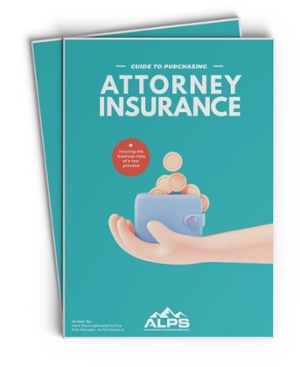1 min read
Getting Help With Malpractice Claims And Bar Grievances
What Not To Do When the Fan Starts Slinging What Just Hit It: Part I of IV Introduction Over the past several weeks, we have had the privilege of...
We've crafted solutions tailored to your firm
The world of insurance for law firms can be confusing, and difficult to navigate. We've created this glossary because these common insurance terms should be easy to understand.
3 min read
 John Ries, Claims Attorney
:
Jan 12, 2023 10:50:17 AM
John Ries, Claims Attorney
:
Jan 12, 2023 10:50:17 AM

At some point in every lawyer’s career, a family member will ask for legal advice and the question arises of whether a lawyer can represent a family member. Not surprisingly, since I handle lawyers' professional liability claims for an insurance company, the question I usually get is if there is insurance coverage in the event a family member sues the lawyer for malpractice.
For most ALPS insureds, the answer is usually “no” because the majority of ALPS’ policies have a specific exclusion for claims made by “a family member or other relative of an Insured.” ALPS does sell a Premier policy, however, which modifies that exclusion if the professional services provided were in the “ordinary course of the Insured’s practice” and if “a fee for professional services was charged and collected.”
So before agreeing to represent a family member or relative, the first thing a lawyer should do is to check to see if he or she has the Premier policy, if insured by ALPS, of to review the policy exclusions to see if there is a family member exclusion. Additionally, if you are considering representing family members in the future, you should talk to your ALPS Account Manager to see if you qualify for the Premier policy.
In the exception to the family member exclusion in the Premier policy, ALPS' use of “ordinary course of the Insured’s practice” is a reference to the competency rule in the Rules of Professional Conduct. In most states, if not all, it is the very first rule because, in my opinion, it is the most important in that it requires a lawyer to provide competent representation to a client which “requires the legal knowledge, skill, thoroughness and preparation reasonably necessary for the representation.” Obviously, a lawyer still needs to analyze potential conflicts of interest, but if the lawyer cannot provide competent representation then the rest of the analysis is moot.
 Learn the basics of Lawyers' Professional Liability Insurance, understand when to purchase, know what your dollars will buy and a few tips when applying for coverage! Check out the ALPS Guide To Purchasing.
Learn the basics of Lawyers' Professional Liability Insurance, understand when to purchase, know what your dollars will buy and a few tips when applying for coverage! Check out the ALPS Guide To Purchasing. In the legal malpractice cases I have seen arising from the representation of family members, this is usually the key issue for two reasons. First, in an effort to help a family member, a lawyer will sometimes agree to handle a case involving an area of law with which the lawyer is not very familiar. For example, if a lawyer’s practice centers around business transactions, he or she should probably avoid handling a family member’s employment discrimination lawsuit. Not only would that representation be in violation of a state’s RPCs but could also create a coverage issue by not being within the “ordinary course of an insured’s practice.”
The second reason, which is a common issue in a lot of legal malpractice claims and Bar complaints, is that a lawyer needs to be able to provide the necessary “thoroughness and preparation” for the family member’s case. This, along with the RPC Diligence rule, requires that a lawyer spend the time necessary to handle the case. Many of the claims that I have seen here at ALPS involve situations where a lawyer is trying to help a friend or relative but ends up putting the case on the “back burner” resulting in a missed deadline or less than satisfactory result. Unfortunately, in these situations, while the intent to help is admirable, the lawyer ends up doing more harm than good.
One thought on why lawyers tend to make more mistakes in handling cases for family members is that the work is often done gratuitously as a favor and lawyers need to take care of paying clients first. To lessen that risk, in the Premier policy’s exception to the family member exclusion, ALPS added a requirement that a fee be charged and collected. While this has not completely fixed the problem, it has seemed to reduce the number of legal malpractice claims from family members and would seem to be a good business practice, in general, because having to bill and collect from family members creates a level of accountability that is missing when a lawyer considers the representation to be a “favor.”
So, yes, a lawyer can represent a family member but that does not mean the lawyer should. Before agreeing to represent a family member, a lawyer should find out if his or her policy excludes family member claims. If the lawyer has ALPS’ Premier policy, the lawyer then needs to do an honest assessment of whether the representation is within his or her normal course of practice, i.e. the lawyer is competent to take the case, and that he or she has the time to handle the case. Finally, with respect to ALPS’ Premier policy, the lawyer needs to bill and collect a fee from the family member. In short, the lawyer should treat the family member as any other paying client and avoid taking cases from family members as a “favor.”
John Ries is a graduate of the University of Montana School of Law and Northwestern School of Law at Lewis & Clark College. John has been a Claims Attorney for ALPS since 2009. Prior to coming to ALPS, John served as a Deputy District Attorney for Union County, Oregon, and an Associate Attorney at Stamper Rubens, PS, in Spokane, Washington.

1 min read
What Not To Do When the Fan Starts Slinging What Just Hit It: Part I of IV Introduction Over the past several weeks, we have had the privilege of...

3 min read
Let’s review the basics. ABA Model Rule 1.2 (c) allows a lawyer to limit the scope of the representation if the limitation is reasonable under the...

I’m lucky to spend some of my free time running in Montana’s mountains and woods. Over the years I’ve occasionally returned from a run with a little...